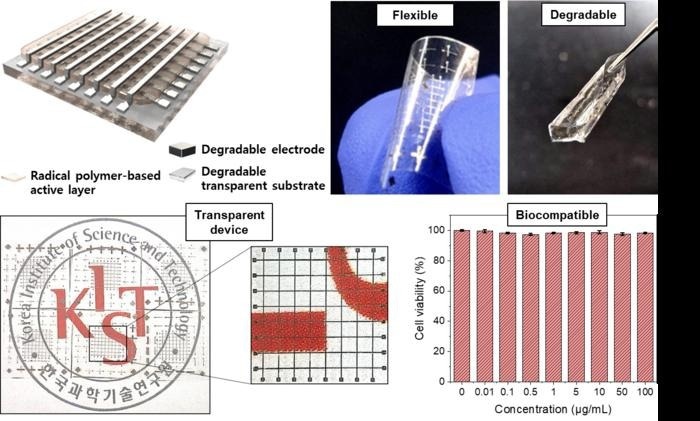The Korea Institute of Science and Technology (KIST) has reported that a collaborative research team, headed by Dr. Sangho Cho of the Center for Extreme Materials Research and Dr. Yongho Joo of the Center for Functional Composite Materials Research, has created a polymeric material that offers high-performance data storage and completely degrades in water within days, according to a study published in Angewandte Chemie International Edition.
 A visual representation of the operating principle and biodegradation process of a high-performance, biodegradable memory device based on PCL-TEMPO, developed by the Korea Institute of Science and Technology (KIST). Image Credit: Korea Institute of Science and Technology (KIST)
A visual representation of the operating principle and biodegradation process of a high-performance, biodegradable memory device based on PCL-TEMPO, developed by the Korea Institute of Science and Technology (KIST). Image Credit: Korea Institute of Science and Technology (KIST)
The use of electronics in many forms is increasing, from wearable gadgets like smartwatches to implantable devices like body-implanted sensors, skin-worn smart patches, and disposable monitoring devices. The devices, which are ultimately abandoned after consumption, contribute to the rising problem of electronic trash (e-waste), a major environmental issue.
The material is biocompatible and stable enough for implantation in the human body, and the rate of deterioration can be regulated by adjusting the thickness and composition of the protective layer. Once this protective layer dissolves, the material dissipates spontaneously in water in about three days, leaving no trace.
Electronic devices that dissolve in water have been created before, but they have often had issues with limited performance, poor data storage, and susceptibility to repetitive mechanical deformation. The KIST research team created a novel molecular structure (PCL-TEMPO) to overcome these obstacles.
It combines polycaprolactone (PCL), a biodegradable polymer, with TEMPO, a functional organic molecule that can store electrical information. This innovative architecture allows a single molecular system to perform natural deterioration and electrical signal storage.
Over a million cycles, the memory device constructed from this material demonstrated exceptional signal discrimination, effectively differentiating between ON and OFF states. Additionally, it successfully saved data for over 10,000 seconds.
Furthermore, despite being bent over 3,000 times and subjected to over 250 write-erase cycles, the device exhibited no deterioration, demonstrating an extraordinary blend of performance and endurance for an organic electronic device.
This technology is useful not only for implanted medical devices but also has potential in disposable healthcare monitoring systems, surgical implants that naturally decay after surgery, eco-friendly data storage devices, and one-time-use military reconnaissance instruments.
Its capacity to dissolve in the body without surgery may dramatically reduce patient suffering and healthcare expenses. Furthermore, this technique addresses the rising issue of e-waste and aids worldwide efforts to achieve carbon neutrality.
This achievement is technologically significant as it marks the first example of integrating physical self-destruction into a high-performance organic memory device. In the future, we aim to evolve this into an 'intelligent transient electronic device' by incorporating self-healing and photo-responsive capabilities, accelerating the commercialization of next-generation bioelectronics and eco-friendly devices.
Dr. Sangho Cho, Study Lead, Korea Institute of Science and Technology (KIST)
The Korea Research Foundation Mid-Career Researcher Support Project (RS-2023-00208313) and the Ministry of Science and ICT (Minister Yoo Sang-im) funded this study through the KIST Institutional Program.
Journal Reference:
Ko, J., et al. (2025) A Biodegradable Radical Polymer Enables High-Performance, Physically Transient Organic Memory. Angewandte Chemie International Edition. doi.org/10.1002/anie.202422826.